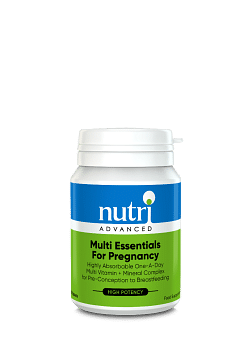Timing of Folic Acid is Key for Healthy Pregnancy
Why you can trust Nutri Advanced Every article on our site is researched thoroughly by our team of highly qualified nutritionists. Find out more about our editorial process.
The link between folic acid and healthy pregnancies is now well established. Most women will receive a prescription for folic acid supplements when their pregnancy is confirmed by their GP. However, the timing of folic acid supplementation is absolutely key, and research shows that this is best done as early as possible and ideally before conception.
Study shows folic acid post conception may be too late
Research carried out in 240,954 pregnant women and published in the British Journal of Nutrition found that taking folic acid supplements post conception may be too late to have a positive effect on key markers of a healthy pregnancy.
This latest research on the hot topic of folic acid supplementation and pregnancy was carried out by researchers from the UK, America and China using data from the Jiaxing Birth Cohort.
The impact of maternal folate status on infant neural tube defects and other congenital disorders is now well accepted. However the association between folic acid supplementation and other outcomes like birth weight and preterm birth is still unclear.
Results of this latest study showed that supplementation with folic acid pre-conception was associated with 8% lower risk of preterm birth and 19% lower risk of small-for-gestational-age birth compared with those who didn’t supplement with the nutrient. However, when folic acid supplementation was started post conception no association was found with either outcome.
The study also found that women were more likely to start supplementation post-conception (14%) than pre-conception (10%).
Start to take folic acid as early as possible
The message is now loud and clear - folic acid supplementation is important in pregnancy, particularly during the pre-conception period and continuing throughout pregnancy. Our advice is to start taking a high quality pregnancy supplement that contains optimal levels of folic acid from the moment you start thinking about having a baby. That way you can ensure folate status builds up to an optimal level at the point of conception, which appears to be the critical time. Women would normally need 200mcg folic acid daily, yet this increases to over 400mcg per day when pregnant – the equivalent of eating well over a kilo of broccoli daily – taking a supplement is therefore a simple and effective way to ensure this higher intake.
Which form to take?
The most effective form of folic acid to take is 5-MTHF (5-methyltetrahydrofolate) – this is a body ready form that the body can use immediately. For genetic reasons, some people lack enzymes to make the conversion into this activated form so other forms of folic acid may be completely ineffective. Since we don’t know which people have the enzymes and which of us don’t, it is advisable that everyone takes this already activated form to ensure everyone benefits from supplementation, and this is especially important during pregnancy. Make sure your pregnancy multi contains folic acid in the form of 5-MTHF.
References:
Zheng JS, Guan Y et al. Pre-conceptional intake of folic acid supplements is inversely associated with risk of preterm birth and small-for-gestational-age birth: a prospective cohort study. British Journal of Nutrition. Published online ahead of print, doi: 10.1017/S0007114515004663
This website and its content is copyright of Nutri Advanced ©. All rights reserved. See our terms & conditions for more detail.
Nutri Advanced has a thorough research process and for any references included, each source is scrutinised beforehand. We aim to use the highest value source where possible, referencing peer-reviewed journals and official guidelines in the first instance before alternatives. You can learn more about how we ensure our content is accurate at time of publication on our editorial policy.
Most Popular Articles
-
7 Surprising Ways To Support Your Magnesium
If you are displaying signs of a magnesium deficiency, here are 7 ways to boost your magnesium levels that are easy to incorporate into your daily life. -
5 Best Vitamin C Supplements Picked By Our Experts
Learn more about the different types of vitamin C, the different benefits you get from different types, and what you get for spending more on a good supplement. -
Top 5 Vitamins For Energy And Tiredness Picked By Our Experts
The 5 best and most important vitamins for energy & tiredness including B vitamin food sources & best supplement forms for energy. -
Benefits of Myo-Inositol for Polycystic Ovary Syndrome (PCOS)
In this research review article, we take a closer look at a lesser-known natural compound called myo-inositol that has been found to have significant potential to improve many of the prevalent features of PCOS. -
Top 10 Reasons to Give Your Kids Omega-3
Read the top 10 reasons that kids should have plenty of Omega-3- an essential fatty acid- including for depression, brain function, sleep & reading/maths skills.












